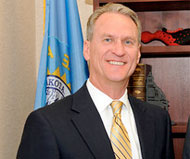3/10/2014
South Dakota Governor Blasts Iowa Traffic CamerasSouth Dakota prepares to prevent traffic camera companies from issuing tickets to residents.

South Dakota Governor Dennis Daugaard (R) is tired of having Sioux City shake down South Dakotans as they pass through Iowa. In a Senate Judiciary Committee hearing Thursday, Daugaard transportation policy advisor Matt Konenkamp blasted Iowa's speed trap tactics and offered an amendment to legislation that would prevent photo enforcement companies like Redflex Traffic Systems of Australia and Arizona-based American Traffic Soluions from accessing the South Dakota driver's license records they need to issue citations. The committee unanimously adopted the recommendation.
"The governor's office finds what Sioux City is doing here abhorrent," Konenkamp told the committee. "They have put together a scheme to allow for them to collect for these tickets without having to prove a criminal violation... This amendment will substantially curtail what they're doing because the manner in which they're getting South Dakota citizens' information is to use a law enforcement agreement for electronic data sharing. They're using that NLETS agreement to collect on civil fines. What this bill does with the amendment is prohibit them from using that. In reality, they're a civil plaintiff."
Daugaard is not picking a fight with his Iowa counterpart, Governor Terry Branstad (R), as Iowa's chief executive has been highly critical of photo enforcement. His Department of Transportation has created new rules designed to severely limit the use of automated ticketing machines on state roads. Branstad has also criticized the camera program in Sioux City as a revenue grab.
"That is absolutely the wrong thing to do," Branstad said.
South Dakota lawmakers and residents piled on Thursday, each telling their own tales of being trapped by the sudden speed limit drop from 65 MPH to 55 MPH on the highway where the camera is positioned in Sioux City.
"As an out-of-stater, I believe I was targeted for the ticket," Jim Melhaff testified. "At the end of the day I decided the only option I had was to pay the $168 and move on. To add insult to injury, I was directed to send the check to an organization in Ohio by the name of 'Sioux City Saves Lives' which was irritating. I put on the envelope, 'Sioux City Extorts Money From Out of State Travelers.' But they cashed the check anyway."
On February 20, the South Dakota House passed by a 69 to 1 vote a bill that would have prohibited speed camera and red light camera systems in other states from using collection agencies to collect fines against South Dakota residents. The measure would also have created a statewide authorization for camera systems in the state. The governor's office came to the rescue by proposing an amendment that forbids state officials from cooperating with speed camera and red light camera companies in issuing out-of-state tickets. The revised measure does not authorize automated ticketing in South Dakota.
"The Department of Public Safety and the Division of Motor Vehicles shall not provide information used to impose or collect a civil fine that results from a violation captured by a red light camera or speed camera through any existing interstate compact that does not specifically allow, or require, information to be shared for that explicit purpose," House Bill 1122 states.
Konenkamp argues that the existing NLETS agreement that allows other states to access driver's license information in South Dakota only allows access for criminal matters. Only California and Arizona treat all photo tickets as criminal charges.
If passed by the full state Senate, the amended bill would have to be re-passed by the state House before being sent to the governor for his signature. A copy of the bill is available in a PDF file at the source link below.


